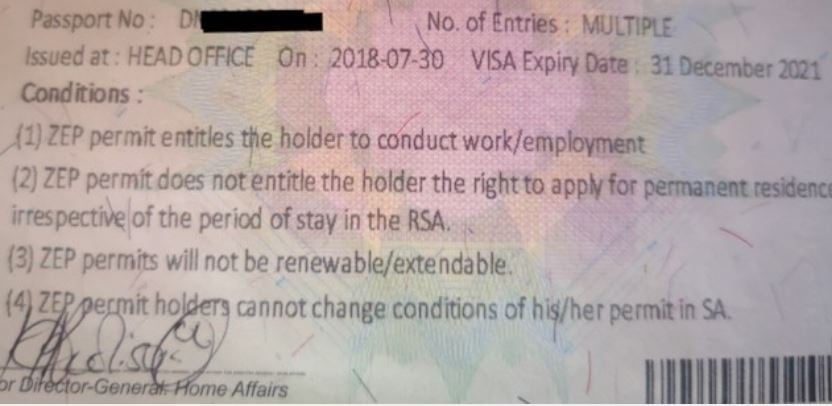
- The Zimbabwean Exemption Permit, which expires on 31 December, will not be renewed, Cabinet announced on Thursday.
- About 182 000 Zimbabwean permit holders have been given a year's grace to migrate to other permits to allow them to stay in South Africa.
- The Cabinet decision is disappointing for many who now face an uncertain future.
Cabinet announced on Thursday the Zimbabwean Exemption Permit (ZEP), which ends on 31 December, will not be extended.
However, it decided on a 12-month grace period during which time ZEP holders "should apply for other permits appropriate to their particular status or situation".
Those who were not successful would have to leave South Africa or face deportation, said Cabinet.
This ends months of rising anxiety for about 180 000 Zimbabweans in South Africa as the ZEP expiry date loomed and there was no indication of what the government intended to do.
READ | Southern African countries facing serious heatwave
Permit holders were debating whether to return home for Christmas.
Many said banks had been refusing to grant them loans and cancelling their pre-approved bond applications, while employers were not renewing contracts because of their uncertain status.
Cabinet’s grace period will not necessarily help in this regard, and many ZEP holders are unlikely to qualify for other permits.
Leaving the announcement to the eleventh-hour also allowed for misinformation that the South African government had extended the permits by five years to circulate on social media, rumours which the Cabinet statement referred to as fake news.
In October 2019, Home Affairs Minister Aaron Motsoaledi told GroundUp the three special permits - which were issued to legalise the status of nationals from Lesotho, Zimbabwe and Angola already living in South Africa - would be renewed.
At the time, he said they could not stop renewing special permits if the problems that led to those special permits were not yet resolved, adding permits could not automatically be renewed by the department; it needed Cabinet.
Cabinet has now spoken.
READ | Law professor detained in Ethiopia
"I'm very disappointed with the decision by the Cabinet," said advocate Simba Chitando, who filed papers in the Gauteng High Court in October requesting the South African government to grant ZEP holders permanent residency, Chitando told GroundUp shortly after the Cabinet announcement, adding:
The ZEP community was divided on Chitando's legal challenge, fearing it would ruin the chance of getting the permit extended. That has now been put to bed.
Democracy
Chitando said the ZEP exploited Zimbabwean labour and made them second-class citizens in a constitutional democracy, "renewable after every four years, operating like a dompas from the apartheid era, in a manner that Zimbabwean migrants to Europe, the US, and Australia, have not experienced".
"It is a slave permit, and an abomination to the pan-African principle of Ubuntu," he added.
He is proceeding with litigation.
READ | Businessman buys Zambian president's signature red jacket for R2m at auction
The Union of Zimbabwean Educators Western (UZEWC) said as much as they were happy about the 12-month reprieve, it still maintained granting permanent residency to deserving Zimbabweans should have been considered.
"Zimbabweans have been on special work permits for more than 10 years, hence their stay in South Africa has been legal. They have been paying taxes. Some have started families here, and have children," said Jack Mutsvairo, union's chairperson.
"We also expect the DHA [Department of Home Affairs] to expeditiously inform employers, creditors and the banking sector … so that none of our members are prejudiced.
"We also hope that the application for other suitable permits by Zimbabweans will not be subjected to avoidable bureaucratic shenanigans. Let this be a user-friendly application process with predetermined timeframes," he added.
There are also other special exemption permits that will need decisions.
On 16 August 2021, the departments opened the application for an Angolan Exemption Permit. The Angolan Special Permit (ASP) was first issued in 2018 and expires at the end of this year.
The Lesotho Exemption Permit (LEP) of 2019 expires on 31 December 2023.In 2009, the South African government introduced a Dispensation of Zimbabwean Permit (DZP) to legalise the many Zimbabweans already inside the country because of the political and socio-economic situation in Zimbabwe.
Zimbabweans who until then had applied for asylum were encouraged to apply for a DZP. When applying, their asylum documents were retained by the Department of Home Affairs.
About 295 000 Zimbabweans applied for the permit. Just over 245 000 permits were issued, with the balance being denied due to lack of passports or non-fulfillment of other requirements. The permits were valid for four years.
In 2014, the DZP was renamed the Zimbabwe Special Permit (ZSP); and then in 2017, renamed the Zimbabwean Exemption Permit (ZEP).
About 182 000 Zimbabweans applied for the ZEP permit when the application process started on 15 September 2017. These permits now expire on 31 December but there is a year grace to seek other permits to legalise the holder’s status in South Africa.




 Publications
Publications
 Partners
Partners


























